A group of New Bedford middle schoolers asked a judge about AI in law. Here's what he said.
NEW BEDFORD — Will court outcomes hinge on the judgement of computers in the future?
The idea became a topic of discussion recently when Mass. Appeals Court Chief Justice Mark Green and his wife, retired Mass. Superior Court Associate Justice Karen Green, visited Keith Middle School last week to talk with a group of eighth grade social studies students. The occasion was part of the American Bar Association-sponsored Judicial Outreach Month, Mark Green said, an annual occurrence in which judges participate in programming aimed at informing students and the general public about the justice system and judges' role in it.
"Who asked that question? I love that question," asked KMS social studies teacher Matt Worstell after reading the question submitted ahead of time by eighth-grader Joseph Higgins: "Would artificial intelligence do better in your position and those of attorneys as they are an unbiased source?"
As it turned out, Mark Green has been spending a lot of time thinking about artificial intelligence, or A.I., lately.
"I will be on a conference call on Monday with experts from around the country around an artificial intelligence program that we will present at the Conference of Intermediate State Court Chief Justices in November in California," Mark Green said, also sharing he's been to multiple conferences and events where A.I. was the topic, as recently as the day prior.
As far as the student's question, Mark Green said "it's way too early to know whether and how artificial intelligence will change or even be available to help lawyers and judges do our work.... We are working very hard to try to understand those possibilities."
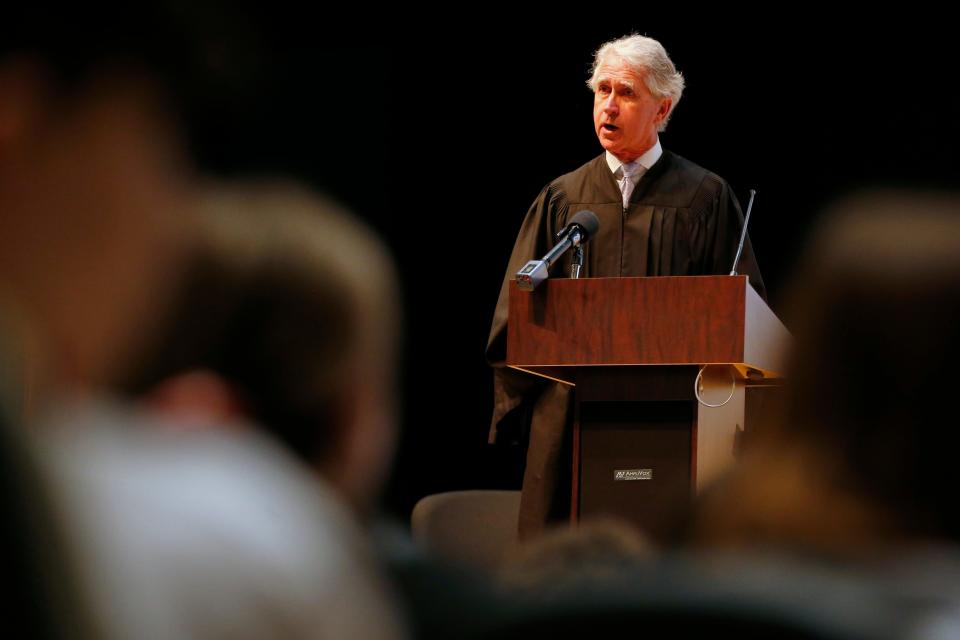
How fair a judge would A.I. be?
One popular assumption Mark Green said was false is that A.I. is unbiased.
"The answer to that, at the moment, is absolutely not...," he said, explaining that A.I. uses something called "large language models" to reach conclusions.
"It takes all of the information that is available from the internet and all kinds of other places and pulls it all together, and then uses data analytics to crawl through that and try to find patterns," Mark Green said. "Well, if you take all of the information that is available in written documents on the internet and around the world, guess what? There's a lot of bias baked into that underlying data set."
Mark Green said figuring out how to improve that processing while weeding out human bias is something artificial intelligence engineers are currently hard at work on.
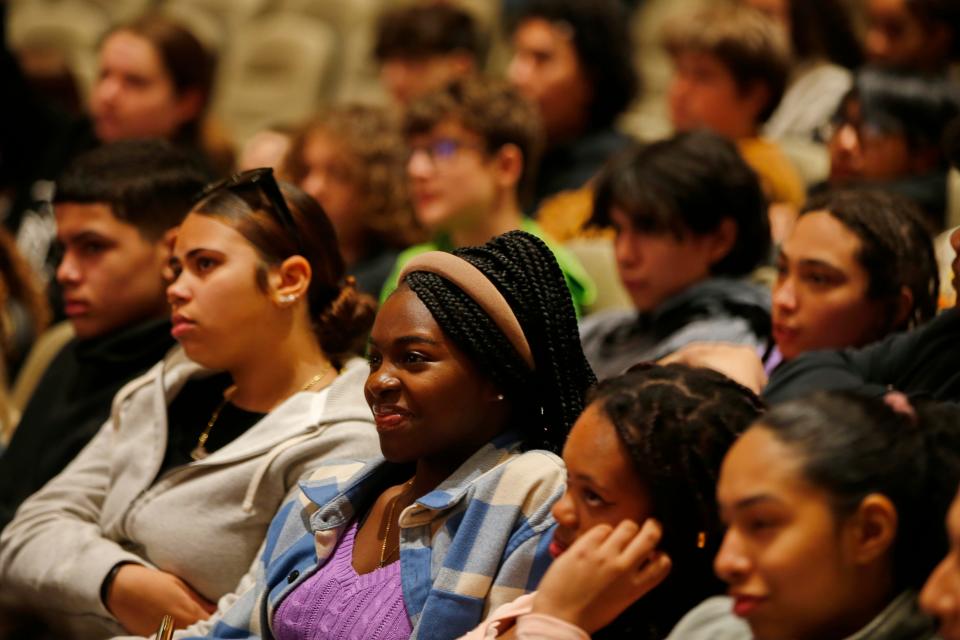
"I've experimented with ChatGPT 4 as you probably have, and for attorneys there are all kinds of products out now to assist them," said Karen Green, mentioning in some cases, attorneys have gotten sanctioned for submitting A.I.-produced filings without checking for accuracy. "My own view is that a lot of that is the fault of the attorney, not artificial intelligence, because we have ethical obligations to make sure that what we're saying in court is true and factual."
However, if mindfully used with discretion, Karen Green told students that A.I., in her view, is "very promising," mentioning her own experimentation having a program put a chronology of events in order — a task that took "two to three minutes."
"Previously, it would have taken me a day or two," she said.
Chief Justice: A.I. still too shrouded in secrecy
Mark Green said one thing is clear: the generation which the KMS eighth graders are a part of will be at the forefront of artificial intelligence's blossoming presence in society. On that note, one thing that remains unclear is how exactly A.I. works beyond a broad description, Mark Green said, urging the students to pay mind to the level of secrecy the technology is kept under.
"One of the requirements of the Rule of Law ... is transparency and openness," he said, "and artificial intelligence poses a challenge, at least at the present time, because we can't look under the hood and understand how we got the answer the artificial intelligence spits out."
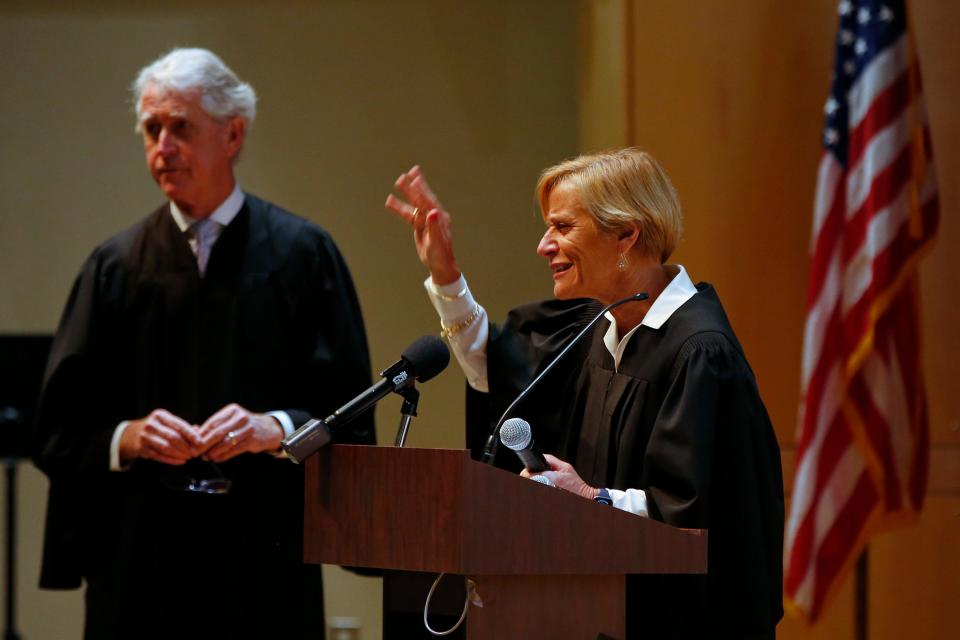
"I think the bottom line on artificial intelligence is it's not ready to replace judges yet," Karen Green said. "I doubt that it will ever be able to perform the role of judge completely, and for now, do not check your brains in at the door.
"If you use ChatGPT 4 or any other artificial intelligence tool, you have to scrutinize what you get back before you embrace it as your own."
Principal: Judges' talk should help students with civics learning
KMS Principal David Mather said with the district and state's new emphasis on civics studies, Friday's visit from the judge and former judge couple should go a long way academically.
"With the advent of civics now for all of the eighth grade, this was an absolutely wonderful opportunity for our students to experience professionals who work directly in that content area," Mather said of the new grade level-wide course. Mather said civics is also set to be a new addition to MCAS testing. "So something like this is very valuable for our students."
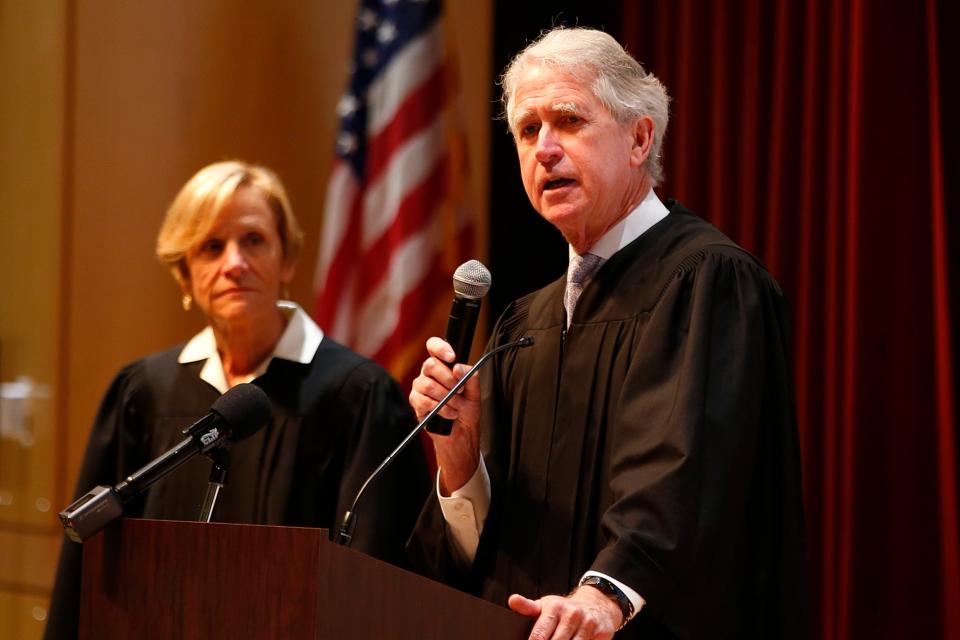
Aside from A.I., topics discussed with the KMS students on Friday included jury duty, judges' daily routines, different types of courts, and what some of Mr. and Mrs. Green's hardest decisions have been on the bench.
"Civics is an essential part of a democracy — our citizens' understanding of the role of government institutions, and particularly the importance of having an independent judiciary as a check on the other two branches of government," Mark Green told The Standard-Times. "If we lose that awareness on the part of the public then we've lost an important pillar of democracy."
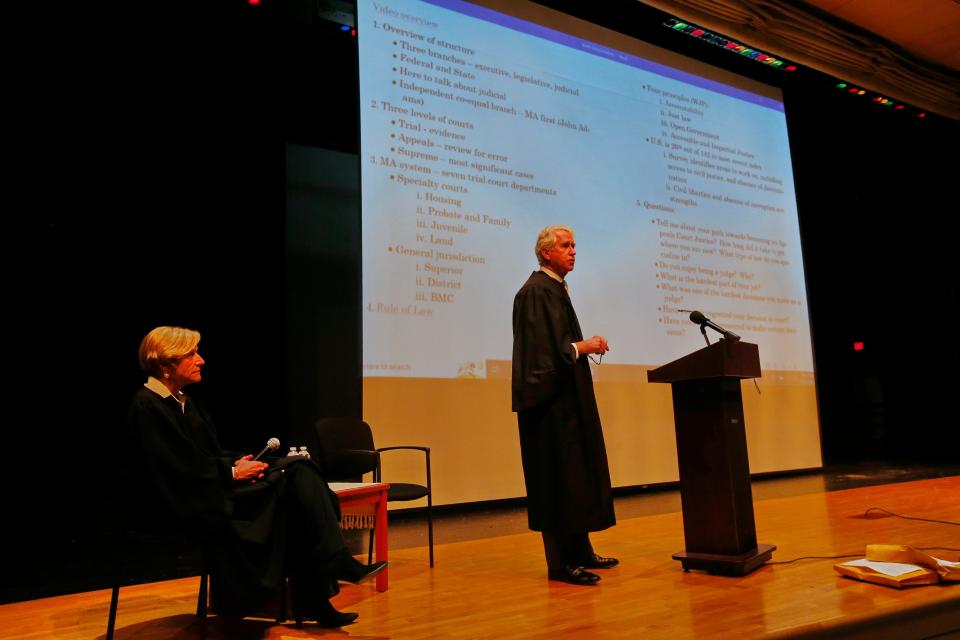
"I think it's more important now than ever before because the Rule of Law has declined throughout the world, including the United States, and I'm worried about the future of our institutions," Karen Green said.
Chief Justice Mark Green is an active member of the Council of Chief Judges of the State Courts of Appeal and of the Executive, Strategic Planning, Finance and Annual Conference committees, according to the state website.
Karen Green retired as an associate justice of the Mass. Superior Court in 2022. She's currently a private attorney, an active member of the World Justice Project's Rule of Law Leadership Council. and the Advisory Board to the American Bar Association's Center for Human Rights.
This article originally appeared on Standard-Times: Keith Middle School 8th graders get visit from judge-fmr. judge couple

